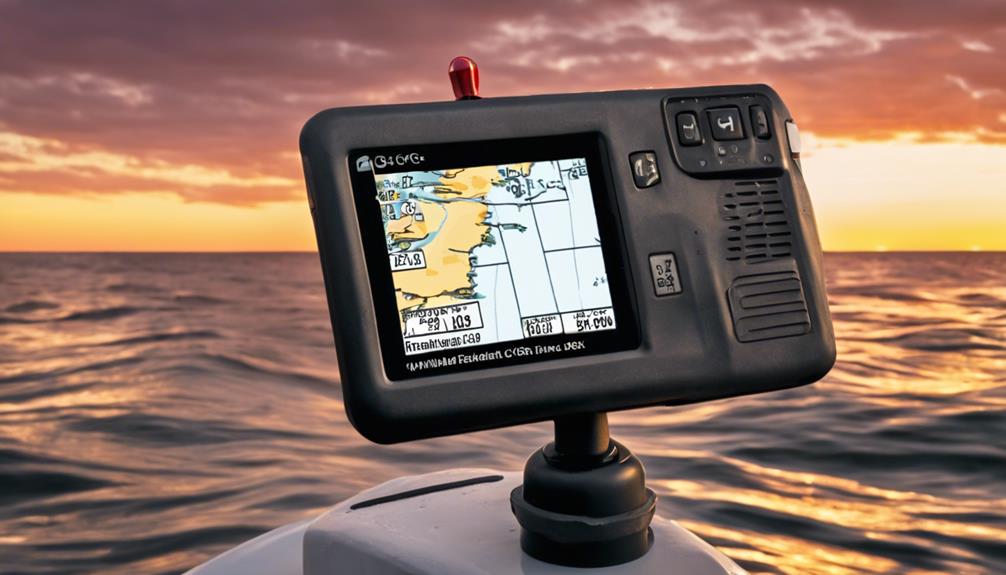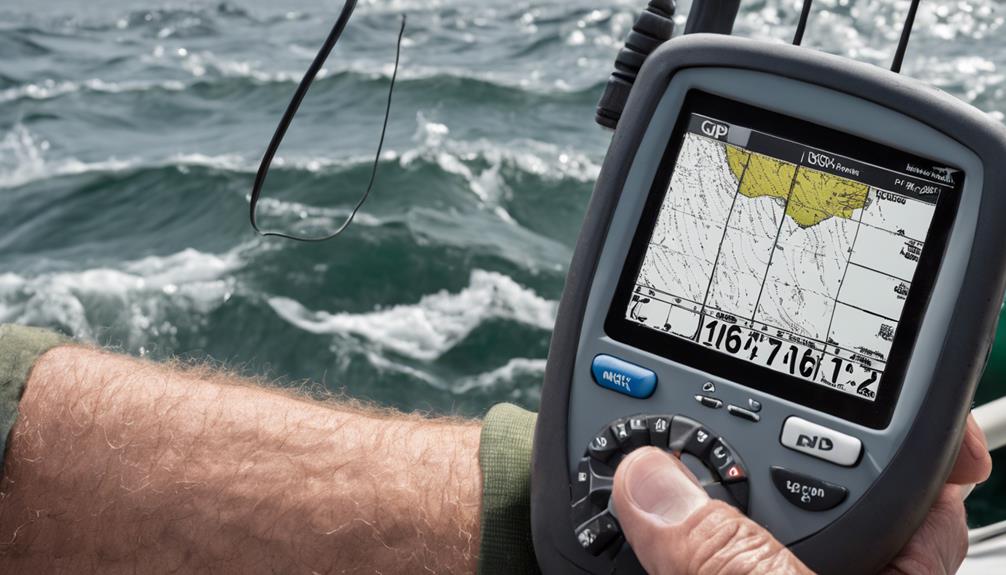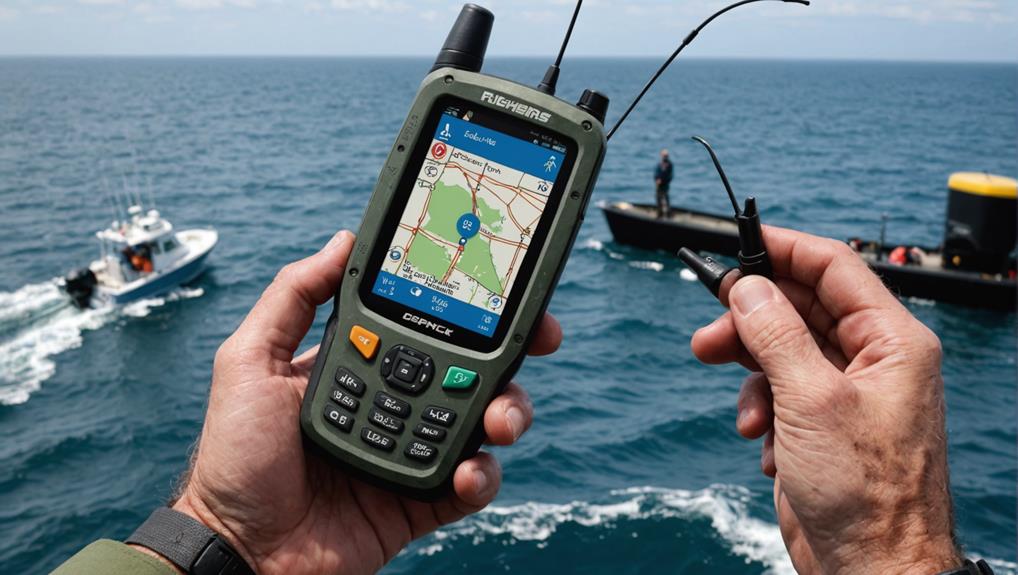When venturing offshore, you've fundamentally got two options for navigation: fixed GPS units, which can falter in adverse conditions, or handheld GPS devices. Handheld units, such as the Garmin Colorado 400, provide a reliable backup charting system, a 7-year track record of performance, and affordable prices, ranging from $100 to $150. They operate independently, using GPS signals without relying on cell towers or Wi-Fi, making them ideal for offshore use. Plus, they allow you to find your way back to specific locations using breadcrumbs and some come with built-in sonar capabilities. Understanding the benefits and capabilities is just the start.
Key Takeaways
- Handheld GPS devices offer reliability and a backup system with a proven 7-year track record of performance offshore.
- Handheld GPS units are portable and can be easily moved to different locations or vessels when needed offshore.
- Handheld GPS devices with built-in sonar capabilities aid in finding fish and charting underwater structures, enhancing offshore navigation.
- Unlike fixed units, handheld GPS devices are affordable, with popular Garmin models available in the $100-$150 price range.
- Handheld GPS units are less prone to single point of failure and can be easily replaced or used as a backup system offshore.
Benefits of Handheld GPS
When it comes to offshore charting, having a reliable backup system can be the difference between life and death.
A handheld GPS device can provide a reliable backup charting system, with a 7-year track record of performance. For instance, the Garmin Colorado 400 and Garmin GPSMAP 62s are popular handheld GPS devices suitable for offshore use.
The Garmin GPSMAP 62s features a Bluechart chip, external antenna, and a readable screen in sunlight, making it an ideal choice. Handheld GPS devices also allow users to find their way back to a specific location using breadcrumbs, a feature that enhances wayfinding and safety.
Additionally, many handheld GPS devices come with built-in sonar capabilities, aiding in finding fish and charting underwater structures.
Handheld GPS devices offer several benefits, including affordability. Garmin handheld GPS devices are available in the $100-$150 price range, making them an affordable option for offshore charting.
You can also consider a backup Handheld GPS device as a secondary option to your primary charting system. Additionally, handheld GPS devices can be used in conjunction with an EPIRB to provide an added layer of safety while offshore.
With a reliable hand held GPS device, you can guarantee a strong GPS signal even in emergency situations.
Understanding GPS Functionality
You've chosen a handheld GPS device as a reliable backup charting system for offshore use. To maximize its effectiveness, it is vital to understand how GPS functionality works in offshore environments. GPS signal reception is poor or non-existent offshore due to the lack of cell towers and Wi-Fi signals. A-GPS technology used in iPhones relies on cell tower information to quickly locate satellites, but without cell tower information, A-GPS takes longer to obtain a satellite lock.
| Device Type | GPS Functionality | Offline Capability |
|---|---|---|
| iPhone | A-GPS | Limited |
| True GPS | Independent | Full |
| Handheld GPS | Independent | Full |
| Car Nav | Independent | Full |
True GPS devices, like car navigation systems, do not require network connections to function. Handheld GPS units also operate independently, providing location information, altitude, and speed without relying on cell towers or Wi-Fi. When you use the GPS, it is imperative to take into account physical barriers and atmospheric conditions that can impact GPS signal strength. By understanding these factors, you can optimize your handheld GPS device's performance offshore.
Marine GPS Navigation Systems

Marine GPS navigation systems offer a wide range of devices designed to meet various offshore piloting needs.
As you explore the options, you'll find devices that cater to different preferences and requirements. A handheld GPS device, for instance, can be used as both a primary piloting tool and a reliable backup.
When considering a marine GPS navigation system, verifying devices with key features such as sonar capabilities, which aid in finding fish and traversing underwater structures, is crucial. Additionally, look for devices with a good depth finder, which is critical for traversing shallow saltwater and lakes.
A handheld GPS device should have waypoint storage and channel marker tracking capabilities, as seen in the Navionics app. Look for devices with a strong track record of performance, such as the Garmin Colorado 400, which has a 7-year record.
Always refer to the GPS manual for specific device instructions and maintenance guidelines to guarantee accuracy and reliability.
Regular checks and maintenance are crucial for all marine GPS navigation systems. Verify that your handheld GPS device is functioning correctly, and consider using it in conjunction with other safety equipment, such as an EPIRB, for added safety.
Importance of Backup Systems
Offshore navigation's high stakes underscore the critical importance of backup systems.
You should consider using a handheld GPS device in conjunction with an EPIRB to minimize the risk of a single point of failure, which can be catastrophic offshore. A backup handheld GPS unit or a complete redundancy of the system is mandatory for long trips offshore, as any component of the electronic charting system (ECS) can fail.
Moreover, choosing a high-sensitivity GPS device with advanced navigation features like WAAS and EGNOS can provide accurate and reliable positioning in emergency situations.
Additionally, a device with a high-resolution display and advanced sonar capabilities, such as CHIRP sonar, can enhance navigation and fishing capabilities.
When choosing a GPS device or app, you should consider factors such as waterproof cases and battery life to guarantee reliability in harsh marine environments.
A means of charging the GPS device or smartphone on board is also essential to guarantee continued functionality in emergency situations.
Regular checks and maintenance should be performed on all safety equipment, including handheld GPS devices, to verify they're functioning correctly in case of an emergency.
Having a spare GPS device or a backup power source can be a lifesaver in critical situations.
GPS Navigation Best Practices

When traversing with a handheld GPS device, one essential aspect to ponder is having a reliable means of keeping the unit powered.
This is especially pivotal when venturing offshore, where access to power sources may be limited.
To guarantee uninterrupted GPS use, consider the following best practices:
- Use a handheld GPS device with AA batteries for added reliability, and carry spare batteries as a backup, just like with portable fish finders which can have up to 10 hours of battery life or rechargeable batteries that provide uninterrupted use.
- Choose a device with a long battery life or one that can be easily recharged on board, as some devices can have rechargeable 12V battery options.
- Regularly update and maintain your handheld GPS device and its associated apps to maintain accuracy and reliability.
- Carry a handheld GPS device in conjunction with an EPIRB (Emergency Position-Indicating Radio Beacon) for added safety, and perform regular checks and maintenance on all safety equipment.
Frequently Asked Questions
Are Handheld GPS Units Obsolete?
You might think handheld GPS units are obsolete due to technology advancements, shifting user preferences, and market trends favoring newer devices, but their durability and long replacement cycles prove they still have a relevant place in navigation.
How Accurate Are Handheld GPS Units?
You can expect handheld GPS units to have an accuracy of 2-15 meters, depending on the GPS signal, satellite geometry, and interference from urban canyons, multipath errors, and atmospheric delay, which affect signal integrity.
What Are the Advantages of Handheld Gps?
You'll find handheld GPS units offer numerous advantages, especially for outdoor enthusiasts, providing marine navigation, rugged design, seamless integration with other devices, and precise tracking capabilities, making them ideal for various applications and environments.
Can You Use a Handheld GPS on a Boat?
"When in doubt, chart a new course." You can use a handheld GPS on a boat for marine navigation, installing boat electronics with GPS mounting solutions that guarantee water resistance, and screens visible even in sunlight.
Conclusion
As you navigate the unpredictable waters offshore, don't be caught without a lifeline – a handheld GPS. It's the unsung hero of marine navigation, providing a reliable backup when fixed units fail. Like a phoenix rising from the ashes, a handheld GPS can breathe new life into a desperate situation. By embracing this technology, you'll be charting a course for safety and success, ensuring that your journey stays on track, even when the seas get rough.

My love for fishing began when I was just a kid, spending summers on the lake with my grandfather. As I grew older, my passion for the sport only intensified, and I began to explore the latest advancements in fishing technology. I quickly realized that there was a lack of reliable and trustworthy resources available for anglers, and I saw an opportunity to fill that gap.

